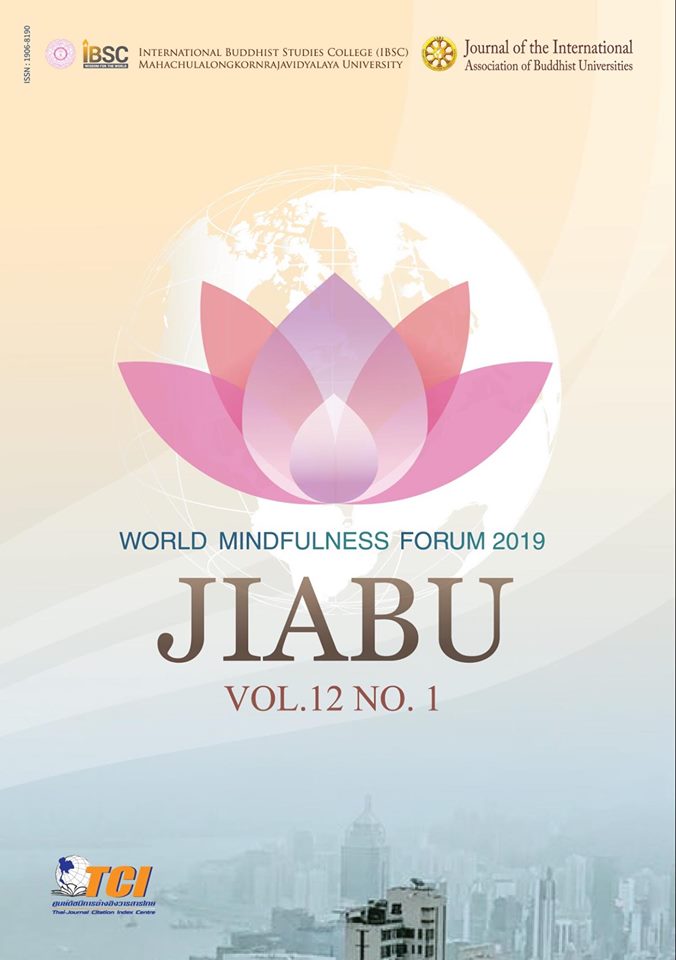The Effects of Buddhist Psychological Factors on the Resilience of Adolescents in Bangkok
Main Article Content
Abstract
The aims of this research were to 1) investigate the concept of resilience in regard
to the western psychological paradigm and Buddhism 2) examine the statistical significance
of on the resilience of adolescents in Bangkok and 3) predict the effects of Buddhist
psychological factors on the resilience of adolescents in Bangkok.
This research is mixed methods Research. The first stage of the research is
qualitative research which aims to collect the variables and then design the instruments
in the quantitative research in the second stage. 12 key-informants were selected by using
purposive sampling. The sample population consists of 495 adolescents in Bangkok by
purposive sampling. The instrument of research was a tripartite questionnaire of which the
three parts were: 1) a part eliciting data concerning demographical characteristics; 2) a part
used to assemble data concerning Buddhist Psychological factors, and 3) a part utilized for
ascertaining resilience. Using techniques of descriptive statistics, the researcher analyzed
the data collected in terms of percentage, mean and standard deviation. The techniques of
t-test and one-way analysis of variance (ANOVA) in addition to Person’s product-moment
correlation coefficient method and multiple regression analysis were also employed by the
researcher.
It was discovered that the most influential factors on the resilience of adolescents in the
Buddhist perspectives are Yoniso-manasikāra (Wise Reflection) (15.79%), Paratoghosa (the
Words of Others) (15.79%) , Sati (Mindfulness) (10.52%), and Viriya (Effort) (10.52%).
In the perspectives of modern psychologists, the influential factors on the resilience of
adolescents Parent-child bonding (9.09%) and Emotional-Regulation (9.09%). The inclusion
of the Buddhist psychological factors can predict the level of resilience displayed by the
adolescents in Bangkok understudy at 70 % at a statistically significant level of .001
(p<.001).
Article Details
Views and opinions expressed in the articles published by The Journal of the International Association of Buddhist Universities (JIABU), are of responsibility by such authors but not the editors and do not necessarily reflect those of the editors.
References
Arias, E. (2003). Deaths: Final Data for 2001. National Vital Statistics Reports. Vol. 52,
No. 3: 1-86.
Department of Mental Health, Public Health Ministry of Thailand (2011). Suicide Rate
Report Classifi ed by Age Group. Retrieved on 1 Feb 2017 from https://dmh.go.th/
report/suicide/age.asp.
Ginsburg and Jablow (2015). Building Resilience in Children and Teens. Illinois: American
Academy of Pediatricts.
Grotberg, E. (1995). A Guide to Promoting Resilience in Children: Strengthening the
Human spirit. The Hague: The Bernard Van Leer Foundation.
Hendin, H. (2002). Suicide and Suicide Prevention in Asia. Geneva: World Health
Organization Document Production Services.
Lotrakul, M. (2006). Suicide in Thailand during the period 1998-2003. Journal of Psychiatry
and Clinical Neurosciences. Vol. 60 No. 1: 90-95.
National Research Council (2002). Community Programs to Promote Youth Development.
Washington DC: National Academies Press.
Nintachan, P. (2007). Resilience and Risk-Taking Behavior Among Thai Adolescents Living
in Bangkok. A Dissertation of Doctor of Philosophy in Family Practice. Graduate
School: Virginia Commonwealth University.
Pardini, D.A. (2000). Religious Faith and Spirituality in Substance Abuse Recovery:
Determining the Mental Health Benefits. Journal of Substance Abuse Treatment.
Vol. 19, No. 4: 347-354.
Peres, F. P. J. (2007). Spirituality and Resilience in Trauma Victims. Journal of Religion and
Health. Vol. 46 No. 3: 343-350.
Raws P. (2016). Understanding Adolescent Neglect: A Study of the Links between Parenting
and Adolescent Neglect. Research Report. The Children’s Society: Britain National
Charity.

